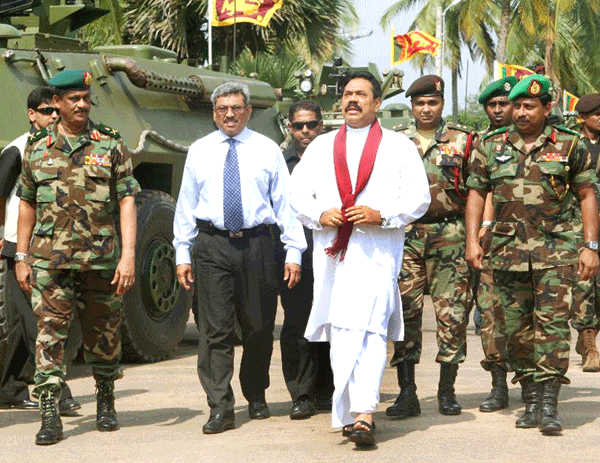
Feizal Samath - The run-up to Sri Lanka’s next presidential elections, expected to be held in mid-January, has created many twists and turns and the possibility of the country’s having its first leader with absolutely no political experience.
Sarath Fonseka, the former army commander credited with leading the army to victory over Tamil separatist rebels in May, is pitting himself against Mahinda Rajapaksa, the incumbent, who on Tuesday called elections two years before completing his six-year term.
Government ministers announced the snap poll on Tuesday. Mr Rajapaksa made the decision to hold early elections to earn a stronger mandate to take the country into a new development phase now that the 30-year war was over.
Political analysts have said the decision, taken some months back, was actually made on the premise that the president’s current popularity might not last two years.
Mr Fonseka, who retired last week from the post of chief of the defence staff, a position he took after relinquishing duties as army commander, said this week he foresaw entering politics but stopped short of saying he would be a presidential candidate. “I will make an announcement on these plans in a day or two,” he told reporters at a business function on Tuesday. In recent months, he has been a popular speaker at business events, giving lessons on leadership and strategy. Reports say he is still in consultations with opposition parties on how to bring all opposing forces together.
Representatives of the People’s Liberation Front, the country’s third largest political force, and the United National Front, a coalition of opposition parties led by the United National Party (UNP), said on Tuesday that they would support Mr Fonseka as the common opposition candidate against Mr Rajapaksa.
The issues at this election, which could also see five to six other smaller and largely ineffective contestants from smaller parties in the fray, are how quickly Sri Lanka’s northern region would be rebuilt after 30 years of destruction, how the country as a whole can develop in a post-war scenario, and restoration of law and order in a society where serious violations of human rights and media rights have taken place.
“It is good that General Fonseka is contesting. He can bring some discipline to the country and stop this corruption,” said Arjuna Sampath Silva, a taxi driver in Colombo.
For the first time, both candidates are expected to use the same strategy to win the poll.
“Both consider themselves war heroes and how they won the war would be their campaign plank,” said a Sinhalese journalist, who declined to be named.
He said the Sinhalese vote will be split between the two candidates with Mr Rajapaksa having the edge by virtue of his political experience.
Jehan Perera, a political commentator for the Island newspaper, said people living in rural areas generally feel the government is in position to deliver on its promises whereas the general is an unknown quantity.
S I Keethaponcalan, a political scientist at the University of Colombo, said the general could be a spoiler for the president. “The Sinhala vote is always divided and that would be the case this time too with the minorities providing the decisive vote,” he said, adding that Tamils have traditionally voted for the UNP and thus may support Mr Fonseka.
The 500,000 or more votes from Tamils living in the northern region could be the deciding factor. At the last presidential poll, in November 2005, Mr Rajapaksa won by 180,000 votes against his closest rival, Ranil Wickremesinghe from the UNP, polling 4.8 million votes against Mr Wickremesinghe’s 4.7 million. The deciding factor then was that the Tamils in the northern rebel-held territory urged Tamils to boycott the poll, saying elections will not solve their problems.
With Mr Wickremesinghe seen as more conciliatory to Tamil demands for more administrative powers in areas where they live and for launching a peace process when his party ruled between 2001 and 2004, it was widely expected that if the Tamils had voted, he would have won.
Losing no time in garnering this crucial support, Mr Rajapaksa moved swiftly last Saturday, deciding that more than 100,000 Tamils displaced by the violence and living in camps without freedom of movement would be allowed to move out by December 1. The government also announced that the settling-in allowance was being increased to 50,000 rupees (US$438) per family from 25,000 rupees. The camps once housed more than 250,000 people.
The government also said it would reduce prices of such staples as sugar and milk powder and provide an extra allowance to soldiers and government officials. Yesterday it ran a full-page advertisement offering jobs to unemployed university graduates.
© The National

















No comments:
Post a Comment